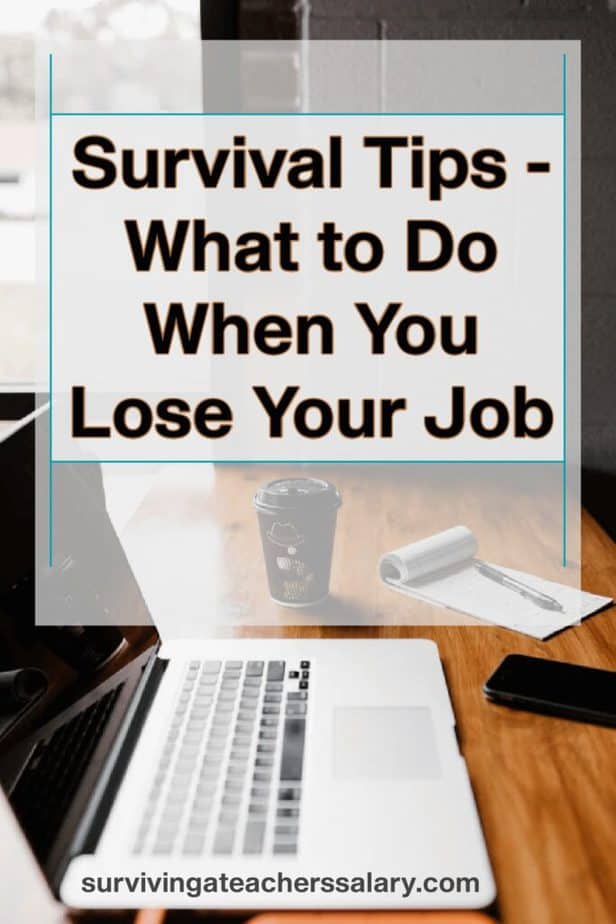What to Do if You’ve Lost Your Job – Survival Tips for Career & Finances
This post may contain affiliate links, view our disclosure policy for details.
For the first time in my husband’s almost 20 year career as a teacher then principal he found himself shockingly and unexpectedly let go from work. He called me and said, “Honey, I’ve lost my job”.
My mind was reeling – I just couldn’t comprehend how this happened! We were absolutely floored and at an immediate 60%+ loss in our income. At almost 40 years old neither of us had ever been let go from our jobs – and to be honest it had never really even crossed our minds that it would even be a possibility!

What made it even worse was that it not only wasn’t warranted but the men in charge had some dirty dealings on the side and had not only blackmailed my husband about the situation but lied to the school community about the decision.
On top of that we had moved our entire family across the country that year JUST so my husband could work at this specific school. We were hurt, confused, lost, and really didn’t know where to begin.
Below are some tips to help you strategize your next move when it comes to losing a job. It’s OK to take two or three days to deal with the hurt and stress of a job gone bad. But don’t wallow there for long, you’ll need all of your energy and focus to decide on your next steps.
Career Tips for When You Lose Your Job:

Decide if you want to change careers.
This unexpected change may be the pivot you need to switch careers. Maybe, like my husband, you would NEVER have left your career field to head into a new direction. Decide if you want to simply apply for another position in the same career field, or if you were truly meant to go another direction.
Changing careers can be scary – especially if you’ve been in one position for a long time and feel like you don’t know where to start! It’s even scarier when you’re looking at a major income loss!
Evaluate your job skills and talents.
Step back from your “career niche” and evaluate the job skills and talents you have picked up over the years. They are probably quite different than when you started out in the work force! This will help you begin determining what type of job your skills would be best suited for.
For example, teaching in a classroom can be used for teaching training courses or even summer camps! A principal can look at a variety of managerial jobs, curriculum development, training companies, etc. Maybe you want to switch careers completely and work from home, in marketing, sales, cleaning, or a number of other fields. Consider beginning your search based on skill set rather than career field and then narrow it down from there.

Look at everything – to start.
Unless you know exactly what route you want to go, consider your “playing field” wide open and begin searching for jobs that match your talents and skill set. Aside from the stress of losing your job and your income, a fresh start is exciting and can revitalize your career path!
The more you look, the more you begin to narrow down what areas you are or are not interested in. It’s ok to entertain a lot of different ideas along the way! This may be the forced opening to create your own business!
Be honest to your future employer.
Although you want to maintain a professional appearance, don’t lie about your last job! If they ask you about being let go or your previous employment stick to the facts and keep emotions out of the way. A good employer will appreciate questions answered honestly and tactfully.
Financial Tips for When You Lose Your Job:
Temporarily pause ALL spending while you re-evaluate your finances.
And I mean ALL! OK, if you’re literally stuck on the side of the road because you ran out of gas that won’t help you, so obviously take care of basic needs. But try to do this step before any major grocery trips, medical appointments, road trips, etc.
You will want to assess every item you spend money on while you are out of work. That includes preventative medical appointments, vet visits, birthday gifts, planned vacations, eating out, house repairs, etc. Consider using a budget app to track your expenses or a shared Google sheet with a spouse.

Apply for unemployment, SNAP, and other assistance programs immediately.
The day you realize you are without income is the day you need to set your pride aside and ask for help. This was the hardest part for us as we have been stubbornly self-reliant our entire lives. Don’t be afraid to tell others what you are going through online and in person. Apply for every assistance program you can get your hands on. Consider visiting food banks and food pantries.
This doesn’t mean you have to use assistance forever, but starting up front with requesting assistance will go a long way to helping you rather than waiting until you’re in dire need and you can’t get help immediately. Be proactive about seeking help.
Sell household items you don’t want/need for quick cash.
There are many things we have in our house that we don’t necessarily NEED. We put together a pile of items to try and sell to temporarily help offset our income loss and cover the necessities like food and utilities. Do NOT sell something you will regret unless you are in dire straits though. We looked through our household decor, appliances and tools we don’t really use, furniture we were willing to part with, books and movies, etc.

Apply for assistance on any outstanding bills.
Once you’ve re-evaluated your finances you should be able to easily see where your money is going, and make decisions on what to pause or request help on. Many hospitals offer medical assistance and grants. Even if you didn’t qualify for them before – call and let them know you’ve lost your job and need help. See if they would be willing to (even temporarily) lessen your monthly payments and help you apply for full assistance.
You may be able to defer your mortgage a month depending on the company, but make sure you understand any implications of doing so!
Consider a temporary job to hold you over until you step into your new career choice.
Consider working through a temp agency, an hourly job, a seasonal job, or through a local Facebook group doing tutoring, handyman work, pet sitting, mowing lawns, etc. while you work on your new career choice. It will help you bring in some cash flow to cover bills until you find the right spot you need to work.





